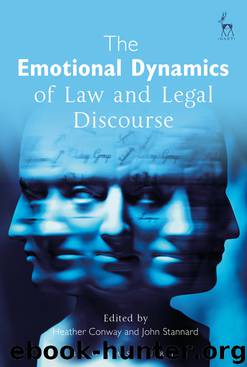Emotional Dynamics of Law and Legal Discourse by Heather Conway John Stannard

Author:Heather Conway,John Stannard
Language: eng
Format: epub
Publisher: Bloomsbury UK
Published: 2016-04-23T04:00:00+00:00
8
Emotions and the Assessment of Credibility
JANE HERLIHY* AND STUART TURNER†
I.Introduction
The first theme of this collection suggests that emotions are, in some cases, pre-existing, or intrinsic to the cases being heard. In some analyses of legal tradition, the law takes on the role of decision-making in spite of such emotions, laying them aside, as far as is possible. As psychologist and psychiatrist, the authors of this chapter argue that it is neither possible nor desirable to put aside the emotional elements of claimants’ accounts or of decision-makers’ responses. In order to achieve justice, or international protection in the case of refugee decisions, the more important task is to understand the role of emotion, and to take it into account in a full and nuanced understanding of the claim.
This chapter, written by two non-lawyers (a psychologist and a psychiatrist) sets out to examine the role of emotion in relation to the difficult decision-making area of credibility assessment using two case examples—torture survivors seeking asylum in another country (involving Refugee Convention and human rights law) and victims of sexual assault including rape (involving criminal law). Torture survivors present themselves with an account of their experience but often with no physical scars and usually with no documentation of their experiences; yet they have to convince a decision-maker that they are at risk of persecution to gain refugee status. In the same way, the prosecution of rape often has to rely on subjective evidence concerning consent; survivors have to be able to persuade a judge or jury that their account of this experience is truthful, and in particular, since rape is often an act of someone known to the victim,1 that they had not consented. It will be argued that reliance on judicial ‘common sense’2 in these situations is often flawed and may lead to incorrect decisions.
In both examples there is a trauma history (hence a state of disturbed emotion, which may or may not amount to a psychiatric disorder), and in neither is there usually sufficient objective corroboration to determine the legal claim. Torture is typically denied by states that perpetrate it, and survivors do not present with medical or prison records from their country of origin. Similarly in the criminal prosecution of rape, while there may be forensic evidence of sexual activity, the issue of consent often comes down to the credibility of the alleged victim as opposed to that of the alleged perpetrator, a process that has been described as a ‘credibility contest’.3 Refugee law judges in their decision-making are advised to draw on ‘common sense and experience’,4 suggesting that their experience in similar cases is seen to be sufficient to guide their understanding of individual and social behaviour in contexts of mortal danger in different cultural settings across the world. Although there may be a great deal of experience in specialist tribunals and courts, this reliance on ‘common sense’ ignores the potential contribution of specialist scientific knowledge in this process. In some cases, medico-legal reports may be submitted, but in the
Download
This site does not store any files on its server. We only index and link to content provided by other sites. Please contact the content providers to delete copyright contents if any and email us, we'll remove relevant links or contents immediately.
Master of the Game by Sidney Sheldon(1881)
GRE Premier 2017 with 6 Practice Tests by Kaplan(1503)
Law School Essays that Made a Difference by Princeton Review(1466)
Law: A Very Short Introduction by Raymond Wacks(1383)
A Life of Crime by Harry Ognall(1381)
Objection! by Nancy Grace(1330)
Examples & Explanations: Administrative Law by William F. Funk & Richard H. Seamon(1326)
Philosophy of law a very short introduction by Raymond Wacks(1297)
Writing to Win: The Legal Writer by Steven D. Stark(1279)
College Essays that Made a Difference by Princeton Review(1265)
Cracking the SAT Premium Edition with 6 Practice Tests, 2017 by Princeton Review(1253)
Sidney Sheldon (1982) Master Of The Game by Sidney Sheldon(1189)
GMAT For Dummies by Lisa Zimmer Hatch & Scott A. Hatch(1188)
Civil Procedure (Aspen Casebooks) by Stephen C. Yeazell(1175)
Drafting Contracts: How and Why Lawyers Do What They Do, Second Edition by Stark Tina L(1171)
Graduate Admissions Essays, Fourth Edition: Write Your Way into the Graduate School of Your Choice by Donald Asher(1138)
Storytelling for Lawyers by Meyer Philip(1136)
So You Want to be a Lawyer by Lisa Fairchild Jones Esq(1096)
INDEFENSIBLE: One Lawyer's Journey Into the Inferno of American Justice by Feige David(1010)
